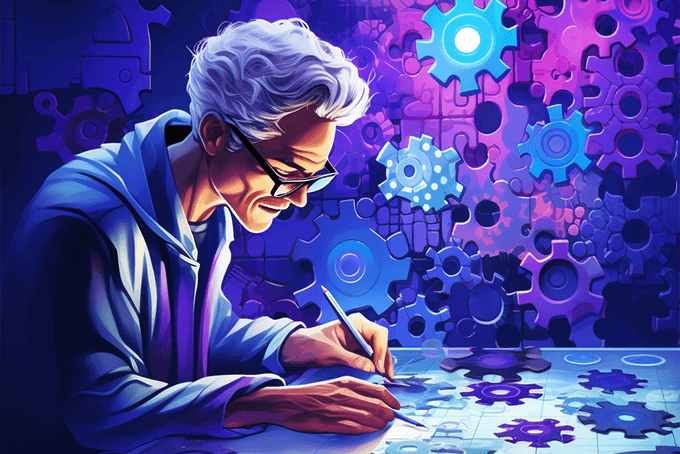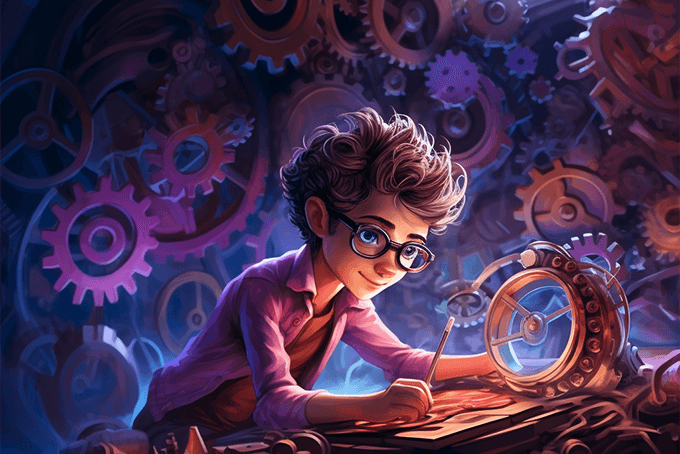By John Dewey (2024)
TL;DR: This essay explores how AI technology could be implemented in education in ways that align with John Dewey‘s philosophy of experiential, student-centered learning to cultivate engaged democratic citizens. It considers opportunities for AI in education to enhance experiential learning through simulations, while also examining risks that must be mitigated through ethical governance.
As an educator and philosopher dedicated to fostering democracy through experiential education, I am fascinated by the transformative power of emerging technologies such as artificial intelligence (AI) to enhance the learning process. However, it is crucial that we approach the implementation of this technology with thoughtful consideration, prioritizing the growth of learners and the betterment of society.
My core belief is that education must be grounded in experience. Students learn best when they are directly engaged with their environment, confronted with real problems, and motivated to find solutions. Traditional education too often relies on rote memorization and passive absorption of abstract concepts. This does not provide students with the tools to apply knowledge in practical ways. AI in education has the potential to create immersive, experiential learning environments. Virtual simulations could place students in roles where they tackle challenges and develop solutions, providing concrete learning experiences.
AI tutors with natural language processing could engage students in Socratic dialogues tailored to their needs and interests. Of course, simulated experiences cannot completely replace hands-on, real-world learning. However, as supplements to instruction centered on tangible projects, they could be tremendously valuable.
An interesting possibility arises when combining augmented reality (AR) and virtual reality (VR) applications with AI. Imagine students learning about ecosystems by immersing themselves in lifelike simulated environments populated with interactive flora and fauna. Or engineers testing prototype designs in advanced VR spaces mimicking real-world physics and mechanics. The experiential nature of these activities could bring abstract knowledge to life in powerfully engaging ways. This resonates with my belief that we learn by doing. At the same time, an overreliance on synthetic experiences could cause a disconnect from reality. Educators must thoughtfully develop AR/VR lessons anchored in concrete objectives, balancing the virtual with the real. When carefully designed, though, AI-enhanced simulations could provide meaningful learning experiences otherwise difficult to create.
To realize AI’s potential while mitigating risks, we must re-envision the teacher’s role. Rather than replace educators, AI in education should augment their abilities to design engaging learning experiences, provide personalized support, and foster critical thinking skills. Teachers must receive specialized training to judiciously integrate AI, continually evaluate its efficacy, and maintain strong interpersonal bonds with students. Formative assessments will be crucial to gather feedback and ensure AI activities have intended outcomes. With teachers as thoughtful guides, AI in education can expand experiential learning’s possibilities.
This experiential approach is key for developing participatory democracy’s requisite skills. Education must empower students to think critically, creatively and cooperatively so they can fully engage as citizens. AI programs could be designed to prompt reflection and teach strategies like logical reasoning. As algorithms improve, AI may even replicate higher-order thinking, analyzing information from multiple perspectives. This could build the intellectual flexibility needed to consider diverse viewpoints. However, over-reliance on prescriptive AI thinking could inhibit original thought. The technology should guide and enhance mental development, not supplant it. There are exciting opportunities here but caution is warranted.
Consider chatbots powered by natural language processing. They could provide customized coaching in metacognitive skills, asking probing questions to stimulate reflective thinking. This may improve critical analysis and idea formation. However, we must ensure chatbots enrich student thinking rather than manipulate it. Essential safeguards include maintaining transparency in the generation of responses. The human educator’s oversight role is key—using AI to expand their reach and effectiveness, not relinquish their responsibilities. Chatbots should empower students to think for themselves, not outsource the thinking. Discretion and balance are imperative.
Cooperative learning is also an essential preparation for participatory democracy. Students must learn to work together, appreciate diversity of thought and background, and resolve conflicts. AI in education has potential here too. Chatbots could allow the safe practice of social skills and ethical thinking. Group learning systems could connect students worldwide to investigate issues collaboratively. Recommender algorithms may suggest productive “learning partners” based on complementary knowledge and skills. However, technology cannot replace face-to-face interaction and real relationships. The use of AI in education must prioritize activities bringing students together in-person. This fosters the empathy and awareness needed for a just, democratic society.
Implementing AI in these enriching ways requires a progressive, student-centered approach. Educators must be empowered to experiment creatively, not just follow dictated curricula. Students should have the agency to choose activities that match their needs and interests. AI tutors and advisors could enable greater personalization, adjusting to each student’s strengths, challenges, preferences, and cultural background. This is the essence of the child-centered education I advocated for decades ago. It may finally be possible to realize it with the help of AI.
However, there are ethical dangers to avoid. AI systems reflect creator biases which can worsen social inequities. Consider the risk of exacerbating discrimination if algorithms track students differently based on race or socioeconomics. There are also privacy risks. Profiling students’ personalities could improve personalization but enables manipulation. Corporations may be tempted to monetize student data or push certain worldviews. Ensuring the ethical application of AI in education requires active governance. Legislators must enact data privacy and algorithmic transparency laws. Educators should receive training in AI ethics and establish oversight committees. Ethical frameworks like “AI for social good” should guide development. Continual audits of systems are essential for bias mitigation. Only through diligent governance can AI-enhanced education avoid harm.
In the end, technology like AI is just a tool. The ends we achieve depend on its thoughtful application. I believe AI has great promise to make education more empowering, experiential and responsive. But centering learners, not machines, is imperative. Success means enriching minds and lives. And crucially, young people must learn responsible technology stewardship. Education must develop their capacity for moral reasoning and wise AI application. Only then can this technology progress democracy and society. Therein lies the path to human progress. With concerted effort, AI could assist in developing creative, socially engaged citizens prepared to build a better tomorrow.
The road ahead will not be without challenges. Integrating emerging technologies into education often meets resistance. But the potential rewards make pursuing this vision essential. My life’s work has been cultivating education that empowers democratic participation. If applied judiciously, AI may bring this ideal closer to reality. We must proceed with care, wisdom and humanity as our guides. But let us also move forward with optimism. With inclusive dialogue and moral imagination, AI could help usher in an enlightened era guided by the highest ideals of democracy. The possibilities excite me greatly as an educator. I hope they excite and inspire you as well.
As we seek to thoughtfully integrate AI into education, I suggest we start with small pilot projects. These can elucidate best practices for AI implementation aligned with student-centered, experiential learning goals. Educators should document experiments, assess outcomes, and share results. With an iterative, evidence-based approach we can progressively refine ethical and enriching applications of this technology. However, the journey begins with a commitment to learning. If we maintain that commitment, AI may help illuminate the path ahead to a more enlightened future for education.




